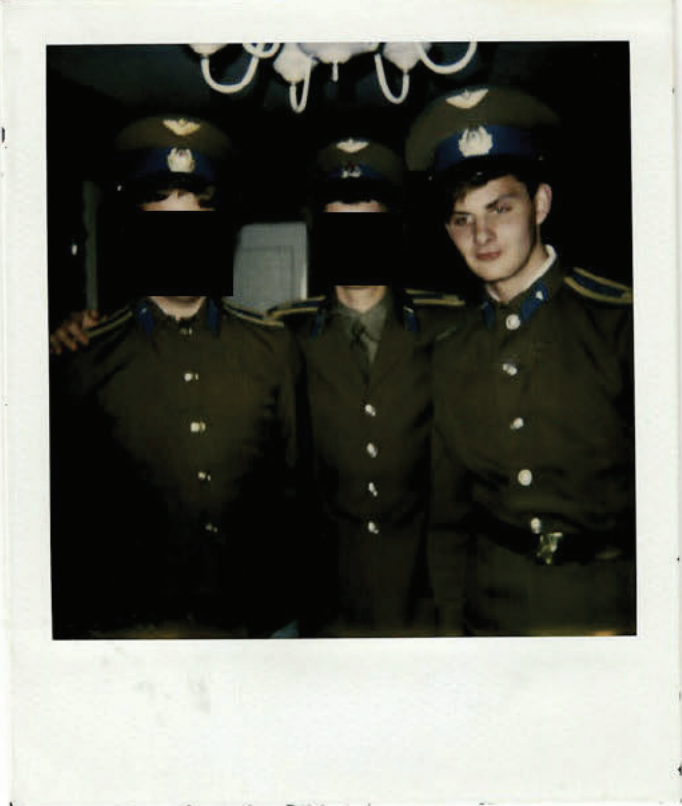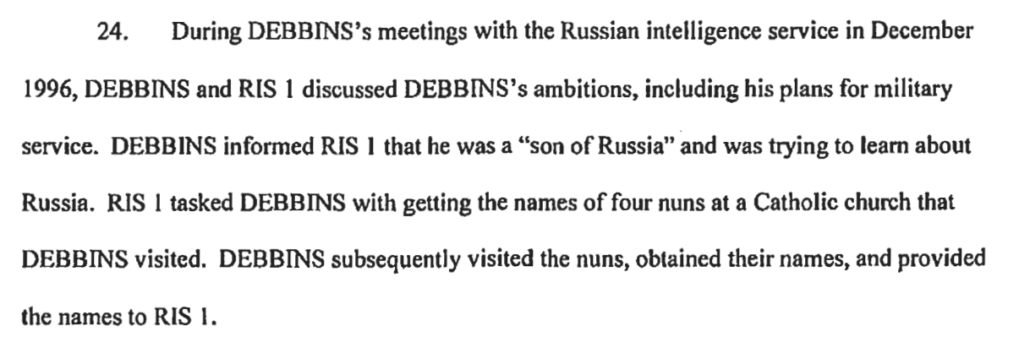Peter Debbins, Shrink-Wrapped Spy
Update: Debbins was sentenced to 188 months, slightly less than the government had requested.
Peter Debbins, the former Special Forces guy who pled guilty to spying for GRU through 2011 last November, will be sentenced today at 10AM ET. Because the sentencing hearing will be in person in the press-stifling Eastern District of VA, there will be scant coverage of the hearing. So I wanted to make an observation beforehand, in case it’s useful for anyone who does show up to EDVA.
The government’s sentencing memo, which was entirely unredacted, basically gave Debbins some credit for cooperating, while at the same time suggesting that they didn’t really believe he had stopped spying at precisely the moment, in 2011, when a renewed TS/SCI clearance would have made him more useful as a spy.
Debbins’ sentencing memo basically argued that evil Russians exploited his same-sex attraction to psychologically torture him, which is why he spied.
Mr. Debbins is extremely self-reflective, recognizing that he had “excellent work performance, high social standing, many friends, and a happy family,” but that on the inside, “with all this psychological and physiological torture” all he wanted was to “unload these racing thoughts to pass my polygraph, without considering the legal ramifications.” Id. Looking back, Mr. Debbins “regrets going to Russia” because he should have known better how “its nefarious government regards people as an expendable commodity, ubiquitous with no intrinsic value and I was especially vulnerable.” Id. More powerfully, Mr. Debbins “regrets not confronting my mental illness earlier and am so heartbroken for all the pain and suffering it caused my family and country.” Id. In his final paragraphs, Mr. Debbins exclaims that the “the Russian GRU ruined my honor and potential as an American,” and asks this Court for its leniency to “restore to me what the Kremlin stole from me, my integrity as an American,” so that “Americans who wish to escape a similar situation are not hopelessly trapped.”
He submitted a declaration describing the symptoms of the “insanity” that caused him to spy.
I descended into insanity unable to distinguish between reality and fantasy, and from 2014 until my arrest, I experienced the following:
- Suffered from insomnia which gave me 3 hours of sleep a night
- Had bizarre dreams, night terrors, and hallucinations of meeting with the GRU. I even thought they were in my house and I removed the smoke detectors believing they were surveillance devices.
- Crossed moral boundaries
- Was always in a manic state of high energy
- My mind would race constantly
- Conducted trances to enter into the “subconscious universe”
- Believed I could communicate via telepathy and dreams
- Excessively used caffeine, alcohol, and sleeping medication
- Believed in signs and omens
- Was paranoid of the GRU and loved ones. I thought my wife and daughter were working for the GRU, which may explain why I didn’t pass the 2019 FBI polygraph. The FBI didn’t believe me when I told them that I had no post-2010 contacts
- Believed the souls of my aunts and uncles who perished from Stalin’s famines were living through me
- Created fantasies of past misdeeds needing atonement
- Had delusions of becoming a double agent
- As a CI professional, I was becoming that what I gazed upon and demonized myself as having affinity to Russia.
The government’s response to Debbins’ submission, which was heavily redacted, basically called bullshit on Debbins’ explanations, laying out with a declaration from one of the FBI Agents who interviewed Debbins over a series of meetings from July to December 2019 how Debbins’ current claims to be motivated by shame about his same-sex attraction conflicts with his comments throughout 2019, when Debbins said he spied out of loyalty to Russia.
During the last interview conducted on December 20,2019, I asked Debbins, “what was the biggest thing … that you think they used, overtly, covertly, implicitly, to encourage the relationship?” Debbins answered, “They just let me feel validated. You know … my meaning … was as a loyal son of Russia. Uhm, I felt, you know, encouragement from them.” Debbins explained, “my mother being Russian, … they … help[ed] reinforce that self-image. “
I assumed, as I know several other people tracking this case assumed, that the large redactions in the government filing were — as most redactions in EDVA are — about national security. I assumed that the boilerplate in the motion to seal the government response would, like most boilerplate in EDVA, discuss the need to seal for national security purposes.
But it doesn’t. It reveals that those sealed sections address Debbins’ confidential health information, his psychiatric diagnosis.
The United States seeks to file the Government’s Response Brief under seal because it contains information from two filings that the Court recently sealed at the request of the defense. See Order (May 10, 2021) (Dkt. No. 52). As the defense explained in its motion to seal, those filings contained confidential health information regarding the defendant.
Sure, the government cheated in one redaction in their footnote 3, which probably rebuts Debbins’ claim to have been fully cooperative with the FBI. But otherwise, we should assume the large swaths of redacted material address Debbins’ psychiatric evaluation.
That’s important, because Debbins is relying on a psychiatric assessment by David Charney.
This behavior from years ago corroborates Dr. Charney’s psychiatric assessment of Mr. Debbins as it relates to his [redacted]
[snip]
This Court is extremely familiar with other such espionage cases, like that of Robert Hanssen, whose espionage activities led to both the imprisonment and deaths of Americans. Another individual, Aldrich Ames, compromised more highly classified CIA assets than any other spy in history, until Robert Hanssen came along. Both Hanssen and Ames received life sentences. Earl Pitts, with whom Dr. Charney is intimately familiar, sold secrets to the Soviets and received hundreds of thousands of dollars for his information. Mr. Pitts received a twenty-seven (27) year sentence. Brian Regan wrote letters to Saddam Hussein, Libya, and China offering to sell information for millions of dollars. He had downloaded tens of thousands of classified documents and was arrested on a plane to Switzerland with the documents. He was sentenced to life in prison after being found guilty by a jury.
[snip]
As such, considering these facts and the psychiatric assessment by Dr. Charney, Mr. Debbins is deserving of a sentence significantly below the low-end of the guidelines.
David Charney is a psychiatrist who worked with the defense teams of Earl Pitts, Robert Hanssen, and Brian Regan — several of those spies that, Debbins is arguing, he is not as bad as. Charney has a non-profit pitching an alternative approach for insider threats, reconciliation, which involves lowering the costs of spies turning themselves in.
Charney alluded to working with Debbins in a December Spy Talk piece in which he argued that rather than the obvious motivations (in Debbins’ case, that he’s loyal to Russia), people actually spy for subconscious reasons only accessible with the help of a shrink.
Trying to understand the psychology of a mole is tougher than it first appears. The acronym MICE is bandied about in intelligence community circles because it seems to cover all the bases of why trusted people turn coat: Money, Ideology, Compromise, Ego. From my experience with year-long interviews of three caught spies, including the notorious Robert Hanssen, and lately with a fourth spy I cannot yet name, I believe the acronym MICE does not suffice.
Human beings are far more complex than the limits of the acronym. There are deeper layers that, in fact, may be far more important. Those may not be fully clear even to the spies themselves: They are subconscious. To simplify things for themselves, disaffected spies try to apply a veneer to their motivations that seems internally plausible. They will seize upon rationalizations that elevate their motivations to appear to serve higher purposes, which is when ideology comes into play. Ideology provides a seemingly coherent higher purpose to their life choices, a morally glorious dimension to their decisions to cross the line. [my emphasis]
Charney’s theory (which he’s pitching to the IC) argues that if only spies can turn themselves in early in their career without the risk of prison time, it’ll lead more spies to do so when they first come to regret their decision.
When someone decides to step over the line to become an insider spy, he or she now find themselves stuck and trapped. It dawns on them that they have no way out. They come to realize it’s unthinkable to beg to be released from their handler because too many bad things can happen. Think of the Mafia.
By the same token, to turn themselves in to their home agency’s security office offers no better prospects. The insider spy cannot expect to be welcomed back. More likely, they spy will face severe punishments leading to career termination and everyone in the intelligence community knows this.
Being stuck in this no-win situation causes the insider spy to resign to stay put, take their chances, and hope for the best. Lacking any viable alternatives, they are forced deeper into the arms of the hostile intelligence service that owns them. And the damages they inflict on our national security accumulate year by year.
What if there were a way out? What if there were an alternative pathway (reconciliation) so an insider spy could voluntarily turn himself or herself in? What if there were a recognized, safe, government-sanctioned exit mechanism? Imagine such a thing.
If reconciliation were made available, what could possibly motivate an insider spy to consider it? The single most important motivator would be that he will not be sentenced to prison. From the perspective of an insider spy, prison would be a deal-breaker. [emphasis original]
Charney may well be right that the US government’s draconian approach to national security crimes ends up doing as much harm as good. But Charney has at the very least a predisposition — and possibly a significant financial incentive — to tell a story about Debbins that blames The Closet for his spying rather than ego, rather than the pride in being Russian that Debbins used to explain his spying before Charney got involved. And Debbins’ lawyer has an incentive to blame The Closet rather than Russian nationalism as well, if only to explain away lingering government concerns that there’s no way Debbins would have stopped spying just when the spying became really useful to Russia, when he got his TS/SCI clearance.
As the government notes in their response, however, Charney’s theory doesn’t apply here because Debbins only turned himself in after failing a polygraph.
There’s another problem with applying Charney’s theories to Debbins. Debbins is right that he’s different than those others in Charney’s comparison set: Pitts, Regan, and (especially) Hanssen. Debbins was not recruited at a time when he was disillusioned with his career, like Hanssen was. Rather, Debbins was recruited from a young age and most of the things he did before 2011 — before he got his TS/SCI restored — were largely grooming activities, grooming activities that largely governed the decisions that put Debbins in a national security position in the first place.
I assume the government makes some of these points in the redacted sections. So the hidden stuff is fairly explainable, once you realize that this is largely about Charney’s arguments about spying.
It’s the unredacted stuff in the government’s response that is still inexplicable. When someone reneges on a statement of responsibility, the government never blows that off in sentencing filings. When Mike Flynn reneged on responsibility for lying to the FBI, for example, prosecutors got all of DOJ to buy off on a much harsher sentencing memo, even though it would have no impact on Flynn’s sentencing guidelines.
Here, however, the government basically argues Debbins’ attempts to back out of things he said when he pled in November will all get accounted for in the sentence they requested before he disclaimed responsibility.
The Government submits that Debbins’s failure to accept responsibility for his conduct and false statements support a guidelines sentence of seventeen years.1
1 The Government does not request that the Court revise the guidelines calculation to take away the 3-level reduction that the probation officer credited Debbins for his timely plea under U.S.S.G. § 3E1.1. Instead, the Government asks the Court to consider Debbins’s failure to accept responsibility and false statements in imposing a substantial sentence within the guidelines range, pursuant to 18 U.S.C. § 3553(a).
Effectively, the government is doing the unheard of thing of having someone dismiss the damage he did to national security concerns with no cost imposed. In EDVA, no less!
The debate at EDVA today may be about Charney’s theories (though I would be shocked if Judge Claude Hilton buys any of this — I wouldn’t be surprised if he sentenced Debbins to more than the 17 years the government is requesting). But the real drama, in my opinion, has to do with why the government is acting so uncharacteristically forgiving.






